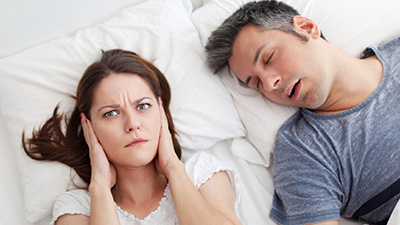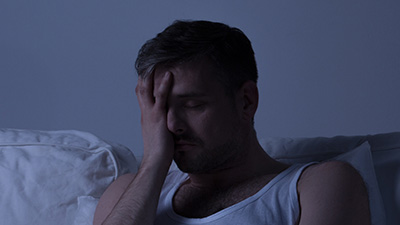Causes of Snoring
Discover the Facts & Next Steps
 Snoring occurs when the airway or passage through which we breathe becomes partially blocked or occluded. An example would be a tongue that falls back as the patient drifts off into deeper sleep. As the diameter or size of the airway passage is shrinking, the net result is a muffled sound secondary to vibrations in the throat, also known as snoring.
Snoring occurs when the airway or passage through which we breathe becomes partially blocked or occluded. An example would be a tongue that falls back as the patient drifts off into deeper sleep. As the diameter or size of the airway passage is shrinking, the net result is a muffled sound secondary to vibrations in the throat, also known as snoring.
Why Choose 21st Century Dental of Irving for Snoring Symptoms?
- Dedicated Early Intervention
- Informative Questionnaires & Testing
- Effective, Comfortable Therapy Options
 In many situations, this compromise is minor and the body continues to get adequate amounts of oxygen to cause little or no harm. However, this should also be considered a red flag, as it could be one of the early signs of developing sleep apnea. Most sleep apnea sufferers snore in between bouts of apnea, or oxygen interruption. A sleep study should be done to determine the seriousness of one's condition.
In many situations, this compromise is minor and the body continues to get adequate amounts of oxygen to cause little or no harm. However, this should also be considered a red flag, as it could be one of the early signs of developing sleep apnea. Most sleep apnea sufferers snore in between bouts of apnea, or oxygen interruption. A sleep study should be done to determine the seriousness of one's condition.
Sleep apnea patients have rough nights and don't even know what is happening in a majority of cases. In a given night, these apneic events (when a patient stops breathing) can occur anywhere from 30 to 50 times and as many as 60 - 100 times per hour in severe cases! Obviously, these individuals awake exhausted and spent each morning, as they've been fighting for oxygen all night. Sleep should be a replenishing award for each of us.
Should you be worried? Well, to answer that, first analyze some signs and symptoms of sleep apnea sufferers. Common side effects of sleep apnea patients are:
- Heart attacks or irregular heart beats
- Impotence
- High blood pressure
- Strokes
- Heartburn
- Morning headaches
- Dry mouth
- Gastroesophageal reflux disease (GERD)
- Impaired concentration
- Depression
- Decreased libido
- Irritability
... and the obvious one, chronic sleepiness. A simple test can be taken that will grade this last symptom called the Epworth Sleepiness Scale. Additionally, a Sleep Observers Questionnaire should be filled out by anyone who regularly observes the potential sleep apneic. Not all apneics will score high, but if you do, it is a very good sign of OSA (obstructive sleep apnea).
It can also cause learning or memory disabilities, as well as periods of nodding off while on the phone or at work. Obviously, sleep apnea patients are at a much greater risk of having auto accidents too.
People most likely to have or develop sleep apnea include those we've mentioned already who snore, as well as patients who are overweight or have high blood pressure. Another concern would be people who have some physical abnormality in the nose (deviated septums), throat, or other parts of the upper airway. One thing we look at in our office is the Mallampati score. There are 4 "grades," and the higher the grade, the smaller the air passage, which is another indicator of sleep disordered breathing.
Another easy marker is neck size. A study of professional football players in the Super Bowl Study turned up astonishing results, as 34% of linemen in that game were diagnosed with sleep disordered breathing, which is roughly 8 times the average. A neck size of 17" or larger is a good indicator of this disorder, and it doesn't matter if it's muscle or fat.
Sleep apnea seems to run in some families, suggesting a possible genetic link. In fact, if you have children, you might keep this in mind, paying specific attention to whether or not they still have their tonsils and adenoids.
Chances are that your spouse, other family members, or your coworkers are keen to the problem. They either also suffer from your noisy snoring or see the signs of a body which is not sleeping at night as it woefully attempts to navigate a given day. Recently, a condition known as "secondary snoring" has been researched and has been shown to cost the bed partner of a snorer an average of 1.5 hours of sleep each night. Snoring, in fact, has also been shown to be a leading cause of divorce.
Nocturnal signs and symptoms associated with OSA include drooling, dry mouth, sleep restlessness, witnessed apneas, choking, gasping, or excessive sweating.
